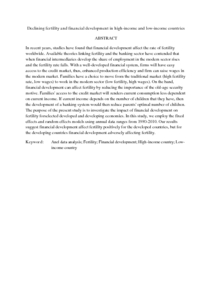Citation
Habibullah, Muzafar Shah and Farzaneh, N. and Din, Badariah
(2016)
Declining fertility and financial development in high - income and low - income countries.
International Journal of Applied Business and Economic Research, 14 (1).
pp. 277-290.
ISSN 0972-7302
Abstract
In recent years, studies have found that financial development affect the rate of fertility worldwide. Available theories linking fertility and the banking sector have contended that when financial intermediaries develop the share of employment in the modern sector rises and the fertility rate falls. With a well-developed financial system, firms will have easy access to the credit market, thus, enhanced production efficiency and firm can raise wages in the modern market. Families have a choice to move from the traditional market (high fertility rate, low wages) to work in the modern sector (low fertility, high wages). On the hand, financial development can affect fertility by reducing the importance of the old-age security motive. Families' access to the credit market will renders current consumption less dependent on current income. If current income depends on the number of children that they have, then the development of a banking system would then reduce parents' optimal number of children. The purpose of the present study is to investigate the impact of financial development on fertility forselected developed and developing economies. In this study, we employ the fixed effects and random effects models using annual data ranges from 1980-2010. Our results suggest financial development affect fertility positively for the developed countries, but for the developing countries financial development adversely affecting fertility.
Download File
![[img]](http://psasir.upm.edu.my/55428/1.hassmallThumbnailVersion/Declining%20fertility%20and%20financial%20development%20in%20high-income%20and%20low-income%20countries.pdf)  Preview |
|
PDF (Abstract)
Declining fertility and financial development in high-income and low-income countries.pdf
Download (84kB)
| Preview
|
|
Additional Metadata
Actions (login required)
 |
View Item |

